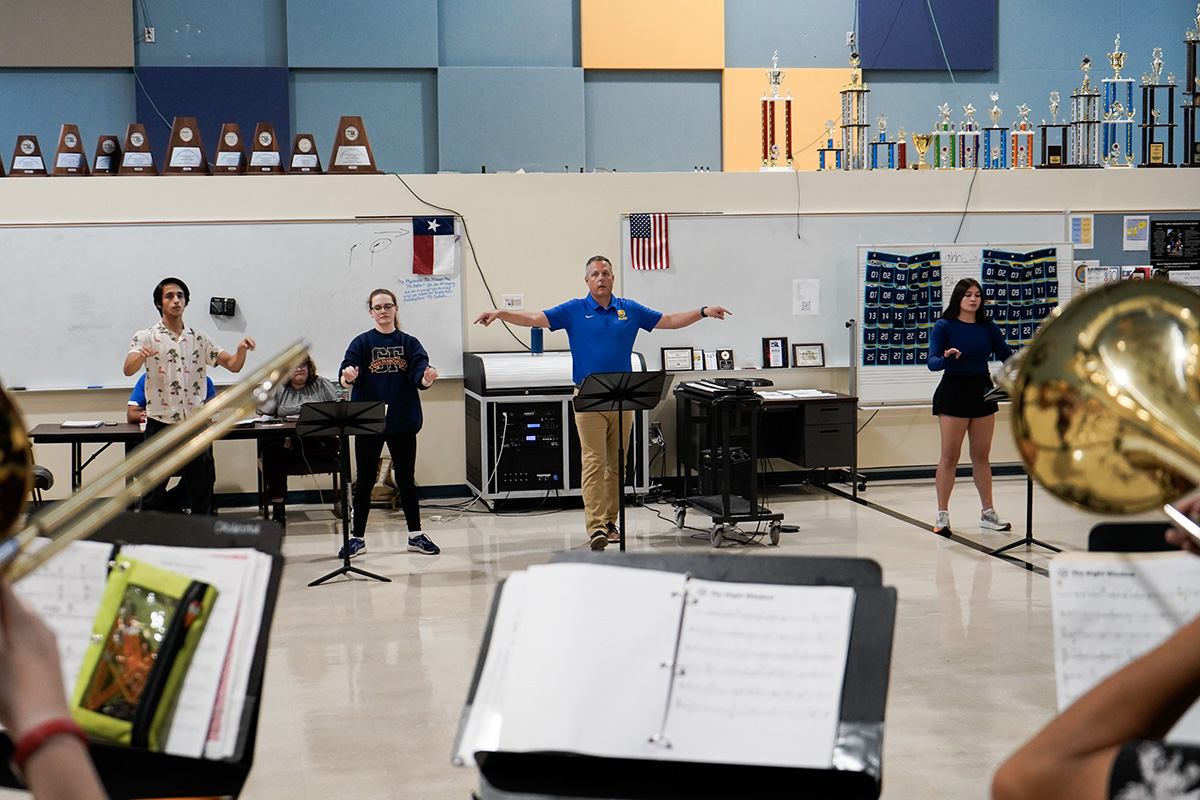Conducting with Purpose: Leadership Strategies from a High School Band Director
By Angel Santiago | Photography by Taylor Lane
Why did the band director go to the doctor? Because he was feeling a little ‘off-beat.’
But being off-beat is never an issue for David Stephenson, Director of Bands and Coordinator of Fine Arts at Alamo Heights High School. With a strong commitment to continuous learning and self-improvement, Stephenson embodies the qualities of an effective leader, ensuring his students and staff stay in harmony with their goals.
In our discussion, Mr. Stephenson emphasized the importance of leadership in guiding a band of 100 to 200 students and colleagues toward a common vision. “First, it’s about establishing the goal and vision, then ensuring everyone is on board and moving together in the same direction,” he explained.
A clear vision is vital for any leader, laying the foundation for success. However, achieving results is just one part of leadership. It’s equally important to develop the necessary skills, traits, and behaviors to guide others toward that vision. Leadership isn’t just about accomplishments; it’s about the values that drive your actions and your commitment to ongoing growth.
Mr. Stephenson prioritizes this continuous learning for himself. “I see continuous learning as a balancing act. On one hand, I strive to become a better teacher and musician. On the other, I consume content on leadership—most of which comes from the business world but is still very applicable here. I try to keep my mind fresh, working, and thinking about new ideas. Whether I’m listening in the car on my drive to school or reading, I always look for ways to apply what I learn to my work with students and colleagues. I want to be in a constant state of learning.”
Research supports his approach. A Bain & Company study found that organizations where leaders have a clear vision are twice as likely to make quick, effective decisions, keeping teams focused on strategic priorities.
One aspect that sets Mr. Stephenson apart is his focus on building relationships. “My unique approach, especially with colleagues, is getting to know the people I work with. The same goes for students—understanding what makes each of them tick. For me, it’s truly about putting the person above the task.”
Prioritizing relationships is a powerful leadership trait that positively impacts both the leader and the team. Leaders who genuinely care for others foster trust, engagement, and resilience. This not only enhances individual and team performance but also contributes to the overall success and sustainability of the organization.
Caring leaders build stronger, more meaningful relationships with their team members, which is essential for effective collaboration and communication. Mr. Stephenson puts it simply: “If I can help create what’s best for them, then they’ll be better teachers, and they’ll be better for the kids. It’s about thinking of the person first over the goal.”
Leadership comes with challenges, and one of the most significant is dealing with failure. Failure can impact a team’s morale, confidence, and willingness to take future risks. Mr. Stephenson recently spoke at a music educators’ convention about the emotional and physical toll failure takes in their field. “I often hear directors say, don’t worry about it, it’s just band. But for me, it’s not just band—it’s a big part of our lives. We put so much time and energy into what we do that when it doesn’t work out, it really hurts. And it’s okay to be upset about it. The important part is picking yourself up, figuring out what went wrong, and using that experience to improve.”
He’s right. We often linger too long in our failures or rush past them without reflection. Acknowledging and grieving our failures is just as crucial as evaluating them and devising a strategy for moving forward. Mr. Stephenson relies on mentors for honest feedback and advice after failures. “I rely heavily on my mentors. They are successful people who know me, our band program, and my teaching. When I talk to them, I can count on them to be real with me, give me advice, and tell me the truth—whether it’s good, bad, or ugly. That kind of feedback makes me a better leader.”
Having mentors is an important part of your success strategy. We all need someone more experienced who truly cares about us and can provide valuable advice and support. This person should be dedicated to helping you grow and able to recognize your potential, even when you doubt yourself.
Do you have a personal or professional success strategy? Having one will empower you to live intentionally, make decisions with confidence, and navigate life’s challenges with a clear sense of purpose and direction. If you don’t yet have a success strategy, now is the perfect time to start crafting one. Begin by reflecting on what really matters to you, set clear goals, and create a step-by-step plan to help you get there. But you don’t have to do it alone. If you’re ready to take control of your future and would like guidance in developing your strategy, I’m here to help. Reach out to me, and together we’ll design a personalized success strategy that aligns with your values and aspirations, setting you on the path to achieving your full potential.
Blessings,
#LifeCoachAngel
210.239.3435







